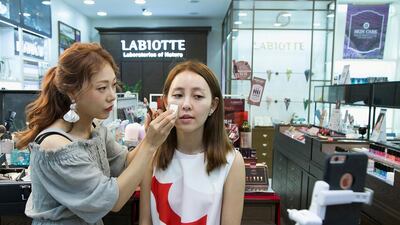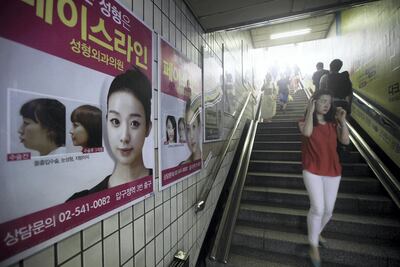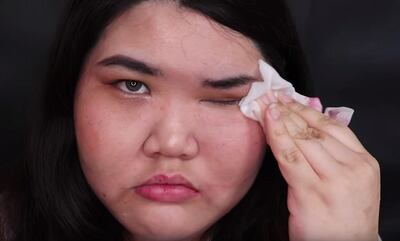The Korean beauty regime is a painstaking art form. If reports are to be believed, it takes two full hours of prepping, cleansing, toning and application before women in South Korea feel ready to face the world. The laborious 10-step skin care routine has provoked intrigue, marvel and imitation from women around the world, many of whom yearn to recreate the “glass skin” look it promises.
The UAE shares Korea’s fascination with cosmetics and skincare. Malls are filled with beauty boutiques boasting the latest miracle products; the country’s cosmetic clinics attract both local and global patrons; and some of the world’s most successful beauty influencers hail from these shores.
K-beauty's arrival in the Emirates was inevitable and embraced by beauty-lovers – snail-slime facials and all. But, as the UAE, and the rest of the world, welcome K-beauty with open arms, a legion of women in South Korea are saying good riddance.
A revolution is gaining steam in the country, with girls and women challenging the beauty standards imposed upon them from a young age. These standards, they say, dictate the need to wear make-up at all times in public – even at the beach – and often lead to young people having cosmetic surgery. The "Escape the Corset" movement, as it's been dubbed, started to gain momentum at the end of last year. The corset is figurative, of course, but acts as a fitting representation of the constraints those involved feel the beauty industry places on their identity.
"Women are forced to wear a [cosmetic] corset that makes you wake up an hour or two earlier to get ready. Some are even pressured to wear make-up to the supermarket because of their insecurities of their bare face," explains YouTube star Lina Bae in a video in which she removes her make-up, even as a string of hateful comments she has received run below.
“Your bare face is a terror to my eyes,” reads one comment, while another jibes: “I didn’t know pigs could wear make-up”. While those online remarks are on the more extreme end, Lina says comments on women’s appearances are part of everyday life in South Korea.
"If women do not focus on their appearance and decide to go bare-faced, co-workers comment 'you really don't care about your looks'; 'you look sick'; or 'you know it's actually considered to be a courtesy to wear make-up in work place'," Lina adds. "Because of this thought, you have to wear base, eyebrow, and lip make-up, even if they do not want to. Even if your eyes are all dried up, you have to wear contact lenses in the nine-to-18-hour workplace."
Lina's video has been viewed more than seven million times. Her defiance, although not without its criticism, has sparked a fire in many other young women, who have flooded Instagram and YouTube with pictures and videos of them bare-faced, smashing up their expensive make-up collections and in some extreme cases, cutting off their hair.
The Escape the Corset movement encourages women to boycott the beauty industry on the first Sunday of each month – to ditch their make-up, to not buy new clothes that day, and to refrain from undergoing any beauty or cosmetic treatments. South Korea has the highest rate of plastic surgery per capita in the world, with about one in three young people there going under the knife, the vast majority of them women.
Videos such as Bae's could help this change. In response to the clip, girls as young as 13 have expressed their concerns over the pressure they face. "Young women around me all wear make-up," one writes. "I don't want to, but I feel like I should."
Another YouTube star, Bambi Girl, also made a video, saying: "I've been creating beauty content for a while now, and one question has consistently nagged at me. Am I doing all of this for my own satisfaction? And I recently realised that the answer was no."
The timing of the Escape the Corset movement is almost paradoxical. As some begin to reject the gruelling K-beauty routine at home, others farther afield are folding it into their everyday lives. The UAE has been home to a number of Korean beauty boutiques for some time now, but interest has particularly peaked over the last two years.
This is thanks, in part, to South Korea's biggest cosmetics manufacturer, AmorePacific, which made some significant changes to its collections to accommodate Muslim and darker-skinned women, as well as making its products widely accessible. On April 10, AmorePacific will announce the launch of four K-beauty cosmetics brands Laniege, Innisfree, Sulwhasoo and Annick Goutal in the UAE.
The Face Shop, which has more than a dozen branches in the UAE, was one of the first brands to introduce K-beauty to this part of the world. “Consumers are a lot more aware of what comprises Korean beauty, and its philosophy of working on and enhancing an individual’s natural beauty to achieve desired results,” says Fatma Ben Ammar, brand manager at The Face Shop, which has seen a rapid increase in interest in Korean beauty since it opened in 2008, with steady growth year-on-year, the store’s staff work closely with its customers to bring in the products they want.
However, Ammar notes that UAE customers are not quite committed to the full gruelling process yet. "I wouldn't say they are following the complete regime, but they are slowly getting the hang of it," Ammar says. "We know of a lot of our customers who follow four to five steps of the 10-step regime, and some have their own versions which work for them. But we believe, with heightened awareness and continual education of the benefits of the 10-step regime, it will become more popular."
It's interesting to note that what counts as oppression among advocates of the Escape the Corset movement, is termed as beneficial by Ammar and many others. It begs the question whether the movement can halt the international growth and popularity of K-beauty. Jongwon Kim, marketing manager for affordable K-beauty brand Kocostar, doesn't think so.
The movement also has a long way to go before the K-beauty industry feels its wrath in monetary terms. The sector contributes $13 billion (Dh47.8bn) to the South Korean economy, according to the latest figures released by Mintel.
Whether it’s a fleeting movement, or the start of major change, Escape the Corset represents an important moment for women in South Korea and around the world. The message that, simply put, boils down to choice, free will and non-judgment, is one that can be learned from wherever you live.
"You do not need to be pretty, or beautiful," Lina tells her YouTube followers. "If you don't want to put on make-up, don't. You don't want to shave? Don't. You don't like your hair? Cut it.
“Since I [was] a girl, I [was] forced to follow rules, but if I don’t want to I will not wear that corset,” she adds. “Someday, I hope that dressing up will become a choice, instead of a must-do job for women.”





